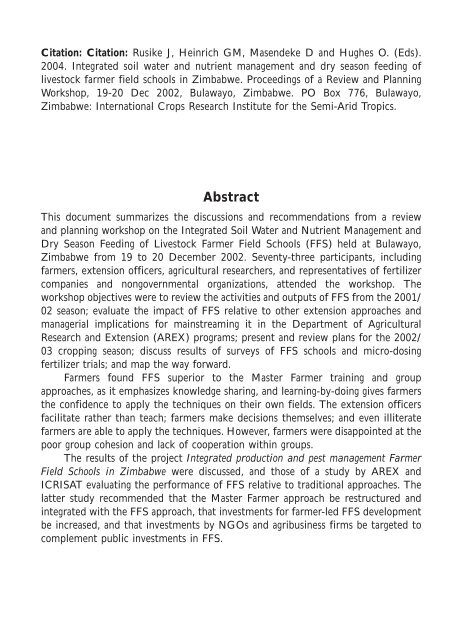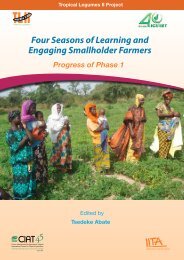Integrated Soil Water and Nutrient Management and Dry ... - Icrisat
Integrated Soil Water and Nutrient Management and Dry ... - Icrisat
Integrated Soil Water and Nutrient Management and Dry ... - Icrisat
Create successful ePaper yourself
Turn your PDF publications into a flip-book with our unique Google optimized e-Paper software.
Citation: Citation: Rusike J, Heinrich GM, Masendeke D <strong>and</strong> Hughes O. (Eds).<br />
2004. <strong>Integrated</strong> soil water <strong>and</strong> nutrient management <strong>and</strong> dry season feeding of<br />
livestock farmer field schools in Zimbabwe. Proceedings of a Review <strong>and</strong> Planning<br />
Workshop, 19-20 Dec 2002, Bulawayo, Zimbabwe. PO Box 776, Bulawayo,<br />
Zimbabwe: International Crops Research Institute for the Semi-Arid Tropics.<br />
Abstract<br />
This document summarizes the discussions <strong>and</strong> recommendations from a review<br />
<strong>and</strong> planning workshop on the <strong>Integrated</strong> <strong>Soil</strong> <strong>Water</strong> <strong>and</strong> <strong>Nutrient</strong> <strong>Management</strong> <strong>and</strong><br />
<strong>Dry</strong> Season Feeding of Livestock Farmer Field Schools (FFS) held at Bulawayo,<br />
Zimbabwe from 19 to 20 December 2002. Seventy-three participants, including<br />
farmers, extension officers, agricultural researchers, <strong>and</strong> representatives of fertilizer<br />
companies <strong>and</strong> nongovernmental organizations, attended the workshop. The<br />
workshop objectives were to review the activities <strong>and</strong> outputs of FFS from the 2001/<br />
02 season; evaluate the impact of FFS relative to other extension approaches <strong>and</strong><br />
managerial implications for mainstreaming it in the Department of Agricultural<br />
Research <strong>and</strong> Extension (AREX) programs; present <strong>and</strong> review plans for the 2002/<br />
03 cropping season; discuss results of surveys of FFS schools <strong>and</strong> micro-dosing<br />
fertilizer trials; <strong>and</strong> map the way forward.<br />
Farmers found FFS superior to the Master Farmer training <strong>and</strong> group<br />
approaches, as it emphasizes knowledge sharing, <strong>and</strong> learning-by-doing gives farmers<br />
the confidence to apply the techniques on their own fields. The extension officers<br />
facilitate rather than teach; farmers make decisions themselves; <strong>and</strong> even illiterate<br />
farmers are able to apply the techniques. However, farmers were disappointed at the<br />
poor group cohesion <strong>and</strong> lack of cooperation within groups.<br />
The results of the project <strong>Integrated</strong> production <strong>and</strong> pest management Farmer<br />
Field Schools in Zimbabwe were discussed, <strong>and</strong> those of a study by AREX <strong>and</strong><br />
ICRISAT evaluating the performance of FFS relative to traditional approaches. The<br />
latter study recommended that the Master Farmer approach be restructured <strong>and</strong><br />
integrated with the FFS approach, that investments for farmer-led FFS development<br />
be increased, <strong>and</strong> that investments by NGOs <strong>and</strong> agribusiness firms be targeted to<br />
complement public investments in FFS.

















